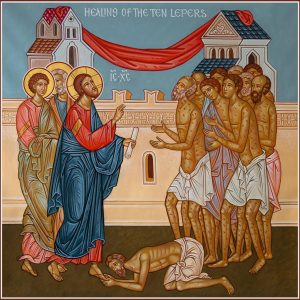 Ephesians 6:10-17; Luke 17:12-19
Ephesians 6:10-17; Luke 17:12-19
In today’s Epistle, St. Paul tells us, “draw your strength from the Lord and from his mighty power. Put on the armor of God so that you may be able to stand firm against the tactics of the devil ….take the helmet of salvation and the sword of the Spirit, which is the word of God.” The true weapon of the Christian is not the metal sword, but the sword of the word.” Hebrews tells us, “the word of God is living and effective, sharper than any two-edged sword, penetrating even between soul and spirit, joints and marrow, and able to discern reflections and thoughts of the heart. (Hebrews 4:12).”
Christians do not meet violence with violence, but when persecuted, follow the Lord’s teaching, “Remember, you are not to prepare your defense beforehand, for I myself shall give you a wisdom in speaking that all your adversaries will be powerless to resist or refute. (Luke 21:14-15)” Jesus is the Word of God, and his word is powerful indeed, and so the true power Christians comes when we speak in the truth of our Lord. Our human words may not seem that powerful, but words spoken in Christ can transform our lives. This power does not come from us, but from God, therefore, as St. Paul again says, “yet I live, no longer I, but Christ lives in me, (Galatians 2:20)” and yesterday’s epistle says, “If we live in the Spirit, let us also follow the Spirit. (Galatians 5:25)” All this has meaning in this Christmas season. We give gifts to one another, and parents instruct their children, say “Thank you,” to those who give you gifts. The words “thank you” are more powerful than the material gifts, for they form bonds of love. As Christians, we, too, say words of “thanks” that bind us in love to God, “the giver of every good and perfect gift. (James 1:17, Ambon Prayer).”
In this church, we utter words of thanksgiving, as we offer our Liturgy, a “sacrifice of praise.” That is why we call the Liturgy the Eucharist, the Greek word for “thanksgiving.” And on Christmas, we offer words to the new-born child, “Christ is born! Glorify him.” We must not only say words with our mouth, “for, if you confess with your mouth that Jesus is Lord and believe in your heart that God raised him from the dead, you will be saved. (Romans 10:9)” But Jesus has to lament today that only one in ten cured return to give thanks. The gospel tells us that we must give thanks to God, who alone brought us into being and who alone can give us salvation. Jesus tells us today that this is difficult, because it requires humility and an open heart. Thus only one of the ten lepers gives thanks, and the least expected, the foreigner.